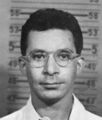Template:Selected anniversaries/May 21: Difference between revisions
No edit summary |
No edit summary |
||
| Line 8: | Line 8: | ||
File:Niccolò Zucchi.png|link=Niccolò Zucchi (nonfiction)|1670: Astronomer and physicist [[Niccolò Zucchi (nonfiction)|Niccolò Zucchi]] dies. He published works on astronomy, optics, mechanics, and magnetism. | File:Niccolò Zucchi.png|link=Niccolò Zucchi (nonfiction)|1670: Astronomer and physicist [[Niccolò Zucchi (nonfiction)|Niccolò Zucchi]] dies. He published works on astronomy, optics, mechanics, and magnetism. | ||
|| | ||Carl Wilhelm Scheele (d. 21 May 1786) was a Swedish Pomeranian and German pharmaceutical chemist. He made a number of chemical discoveries before others who are generally given the credit. For example, Scheele discovered oxygen (although Joseph Priestley published his findings first), and identified molybdenum, tungsten, barium, hydrogen, and chlorine before Humphry Davy, among others. Pic. | ||
||1792 – Gaspard-Gustave de Coriolis, French mathematician and engineer (d. 1843) | ||1792 – Gaspard-Gustave de Coriolis, French mathematician and engineer (d. 1843) | ||
Revision as of 16:30, 12 February 2018
1471: Painter, engraver, and mathematician Albrecht Dürer born. He will introduction of classical motifs into Northern art through his knowledge of Italian artists and German humanists.
1670: Astronomer and physicist Niccolò Zucchi dies. He published works on astronomy, optics, mechanics, and magnetism.
1923: Mathematician and academic Armand Borel born. He will work in algebraic topology, and in the theory of Lie groups. He will contribute to the creation of the contemporary theory of linear algebraic groups.
1932: Bad weather forces aviator Amelia Earhart to land in a pasture in Derry, Northern Ireland, after flying solo across the Atlantic Ocean.
1946: Physicist Louis Slotin is fatally irradiated in a criticality incident during an experiment with the demon core at Los Alamos National Laboratory.
1953: Logician and mathematician Ernst Friedrich Ferdinand Zermelo dies. His work had major implications for the foundations of mathematics; he is known for his role in developing Zermelo–Fraenkel axiomatic set theory, and for his proof of the well-ordering theorem.





